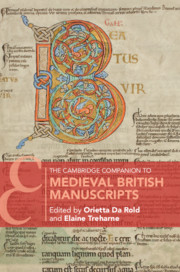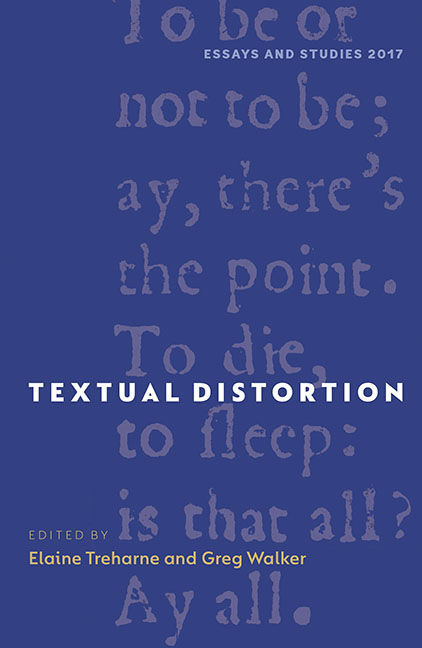55 results
Chapter 1 - ‘Miserere, meidens’
- from I - Patrons, Owners, Writers, and Readers in England and Europe
-
-
- Book:
- Women and Medieval Literary Culture
- Published online:
- 28 July 2023
- Print publication:
- 17 August 2023, pp 27-49
-
- Chapter
- Export citation
13 - ‘IC þæt Secgan Mæg’: Women, Song, Story, Presence
-
-
- Book:
- Women's Literary Cultures in the Global Middle Ages
- Published by:
- Boydell & Brewer
- Published online:
- 09 January 2024
- Print publication:
- 04 April 2023, pp 243-260
-
- Chapter
- Export citation
7 - The Presence of the Hands: Sculpture and Script in the Eighth to Twelfth Centuries
-
-
- Book:
- Medieval English and Dutch Literatures: the European Context
- Published by:
- Boydell & Brewer
- Published online:
- 08 October 2022
- Print publication:
- 12 July 2022, pp 127-150
-
- Chapter
- Export citation
6 - Networks of Writers and Readers
- from Part II - Why Do We Study the Manuscript?
-
-
- Book:
- The Cambridge Companion to Medieval British Manuscripts
- Published online:
- 11 December 2020
- Print publication:
- 17 December 2020, pp 129-148
-
- Chapter
- Export citation
Guide to Further Reading
-
- Book:
- The Cambridge Companion to Medieval British Manuscripts
- Published online:
- 11 December 2020
- Print publication:
- 17 December 2020, pp 295-307
-
- Chapter
- Export citation
Contributors
-
- Book:
- The Cambridge Companion to Medieval British Manuscripts
- Published online:
- 11 December 2020
- Print publication:
- 17 December 2020, pp ix-xi
-
- Chapter
- Export citation
Abbreviations
-
- Book:
- The Cambridge Companion to Medieval British Manuscripts
- Published online:
- 11 December 2020
- Print publication:
- 17 December 2020, pp xiii-xiv
-
- Chapter
- Export citation
Part II - Why Do We Study the Manuscript?
-
- Book:
- The Cambridge Companion to Medieval British Manuscripts
- Published online:
- 11 December 2020
- Print publication:
- 17 December 2020, pp 127-234
-
- Chapter
- Export citation
Contents
-
- Book:
- The Cambridge Companion to Medieval British Manuscripts
- Published online:
- 11 December 2020
- Print publication:
- 17 December 2020, pp v-vi
-
- Chapter
- Export citation
Index
-
- Book:
- The Cambridge Companion to Medieval British Manuscripts
- Published online:
- 11 December 2020
- Print publication:
- 17 December 2020, pp 308-309
-
- Chapter
- Export citation
Introduction: The Matter of Manuscripts and Methodologies
-
-
- Book:
- The Cambridge Companion to Medieval British Manuscripts
- Published online:
- 11 December 2020
- Print publication:
- 17 December 2020, pp 1-10
-
- Chapter
- Export citation
Part I - How Do We Study the Manuscript?
-
- Book:
- The Cambridge Companion to Medieval British Manuscripts
- Published online:
- 11 December 2020
- Print publication:
- 17 December 2020, pp 11-126
-
- Chapter
- Export citation
Copyright page
-
- Book:
- The Cambridge Companion to Medieval British Manuscripts
- Published online:
- 11 December 2020
- Print publication:
- 17 December 2020, pp iv-iv
-
- Chapter
- Export citation
Acknowledgements
-
- Book:
- The Cambridge Companion to Medieval British Manuscripts
- Published online:
- 11 December 2020
- Print publication:
- 17 December 2020, pp xii-xii
-
- Chapter
- Export citation
Part III - Where Do We Study the Manuscript?
-
- Book:
- The Cambridge Companion to Medieval British Manuscripts
- Published online:
- 11 December 2020
- Print publication:
- 17 December 2020, pp 235-294
-
- Chapter
- Export citation
Illustrations
-
- Book:
- The Cambridge Companion to Medieval British Manuscripts
- Published online:
- 11 December 2020
- Print publication:
- 17 December 2020, pp vii-viii
-
- Chapter
- Export citation
GENERAL INDEX
-
- Book:
- The Cambridge Companion to Medieval British Manuscripts
- Published online:
- 11 December 2020
- Print publication:
- 17 December 2020, pp 310-319
-
- Chapter
- Export citation

The Cambridge Companion to Medieval British Manuscripts
-
- Published online:
- 11 December 2020
- Print publication:
- 17 December 2020
VII - John Steinbeck’s ‘Wonder-Words’
-
-
- Book:
- Arthurian Literature XXXV
- Published by:
- Boydell & Brewer
- Published online:
- 11 September 2020
- Print publication:
- 20 December 2019, pp 173-191
-
- Chapter
- Export citation

Textual Distortion
-
- Published by:
- Boydell & Brewer
- Published online:
- 24 August 2019
- Print publication:
- 17 November 2017



